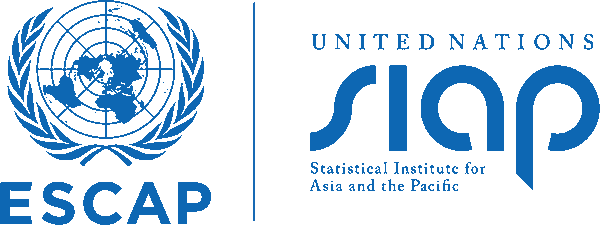Webinars on Macroeconomic Statistics Framework 23 and 25 January 2024 Macroeconomic accounts provide comprehensive and detailed records of the complex economic activities taking place within an economy, and of the interactions between different economic agents, and groups of agents, in markets or elsewhere. As such, harmonization and consistency of the accounting framework allow economic data to be compiled and presented in a format that supports economic analysis, and policy decision making. This webinar series will provide the participants with a clear understanding of the importance of macroeconomic statistics and its components to an economy, whilst focusing on the fundamentals of the macroeconomic and financial statistics....here. |
|
|
| |
| Training Workshop on Compiling Energy and Air Emission Accounts 5 - 15 February 2024, Chiba, Japan The Statistics Department (STA) of the International Monetary Fund (IMF), is implementing the "Environment and Climate Change Statistics Capacity Development Program", supported by the State Economic Cooperation (SECO). The program is oriented towards assisting beneficiary countries in the development and dissemination of indicators most relevant to their policy needs. Accordingly, technical assistance will focus on developing one or two indicators that reflect the most urgent data needs of the targeted countries; and encompass the use of internationally agreed methodology or testing methodology underdevelopment... here |
|
Webinar on the Management of Statistics Capacity Building in the Pacific 21 February 2024 SIAP partnered with SPC to organize a webinar focused the statistical capacity development in the Pacific. The webinar served as a forum for practitioners to take stock of the capability and capacity needs of the Pacific islands, delve into challenges and identify potential opportunities and solutions. The webinar featured presentations from SIAP and SPC on the training needs assessments conducted by each institution to identify the unmet training needs of the Asia-Pacific region and Pacific subregion, respectively. It also included a panel discussion during which panelists shared valuable insights and their reflections on the capacity and capability challenges of the Pacific as well as their recommendations on how to better leverage South-South cooperation to address the recurring challenges. The insights and contributions shared during the webinar are expected to help in shaping a comprehensive implementation roadmap for capacity and capability development for Pacific statistics. |
|
|
Webinar on Measuring Digital Trade 6 March 2024
This webinar will provide the participants with a clear understanding of the importance of measuring digital trade, and the conceptual framework for measuring digital trade whilst focusing on the fundamental concepts and statistical definitions. A variety of examples and practical applications will be shared by country representatives. The webinar will also emphasize the importance of digital trade statistics in evidence-based policy making. ...here.
|
|
|
| |
| Regional Course on Statistical Business Registers 11-14 March 2024 Chiba, Japan Statistical Business Registers (SBRs) are often described as the backbone of economic statistics, as they provide the core infrastructure to support the collection of economic data and the production of economic statistics. They provide a coherent set of units and classifications to collect and compile data across all domains, and a consistent set of rules to maintain this set of units over time. SBRs are considered as the backbone for producing economic statistics that meet the increasing demand for better integrated, coherent and comparable statistics...here. |
|
e-Learning course:Introduction to the System of Environmental Economic Accounting (SEEA) Central Framework 4 March – 12 April 2024
This course introduces the SEEA Central Framework, the international statistical standards for measuring the interactions between the environment and the economy. It is comprised of 5 modules. The first module introduces the SEEA. Modules 2 discusses accounting for physical flows while module 3 discusses accounting for environmental assets. The fourth module contains details on environmental activity accounts, combined presentations and indicators. The last module contains an overview of subsystems, applications and extensions. ....here.
|
|
|
e-Learning course:The International Recommendations on Refugee, IDP and Statelessness Statistics 1 April-24 May 2024
The numbers of refugees and internally displaced persons (IDPs) have increased rapidly in recent years, with UNHCR estimating over 108.4 million forcibly displaced persons in 2022. Similarly, the issue of statelessness continues to persist in society, with 4.4 million people currently estimated to be stateless. This course introduces the “International Recommendations on Refugee Statistics” (IRRS), the “International Recommendations on IDP Statistics” (IRIS) and the “International Recommendations on Statelessness Statistics” (IROSS). These sets of recommendations were endorsed by the United Nations Statistical Commission in 2018 (IRRS), 2020 (IRIS) and 2023 (IROSS), respectively. The course is spread over six substantive modules and provides details on the statistical framework for compiling refugee, IDP and stateless persons statistics. It introduces concepts, definitions, classifications and methodologies relevant to collecting, compiling, analyzing and disseminating data and indicators on refugees, IDPs and stateless persons, 2 including Sustainable Development Goal (SDG) indicators. The course also includes information on data sources, institutional mechanisms, and coordination. Please click here to register for this course. Further information about the course will be provided to registered participants at the end of March.
|
|
|
SIAP E-learning System
SIAP offers a range of e-learning courses across the domains of social, environment and economic statistics; data science; and statistical principles and methodologies. These courses are facilitated and supported by an expert in the field to the participants through regular communication in discussion box and through webinar(s) during the period of course delivery. A certificate is issued to successful participants completing the course after passing the prescribed examination. |
|
|
|
|
